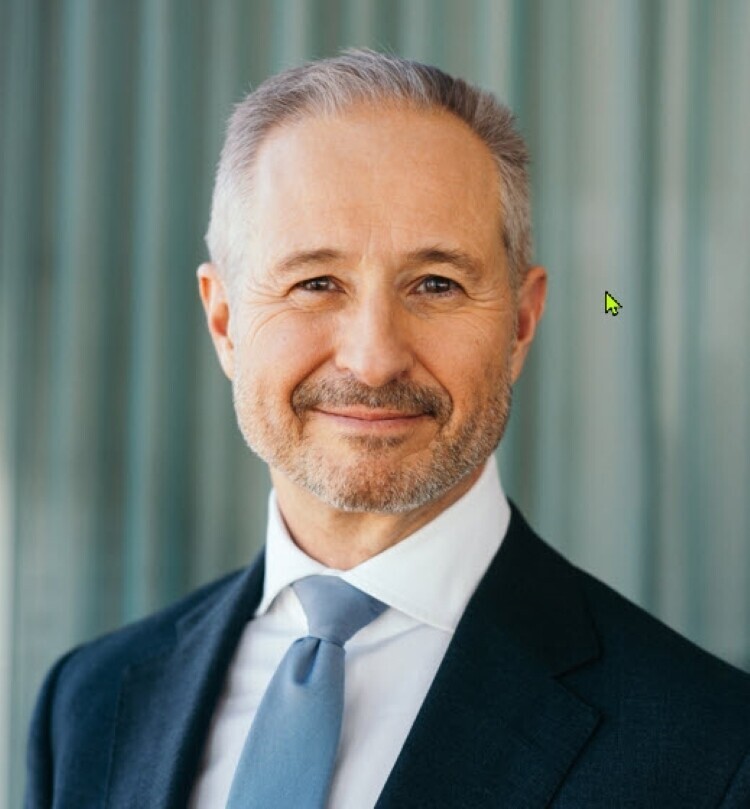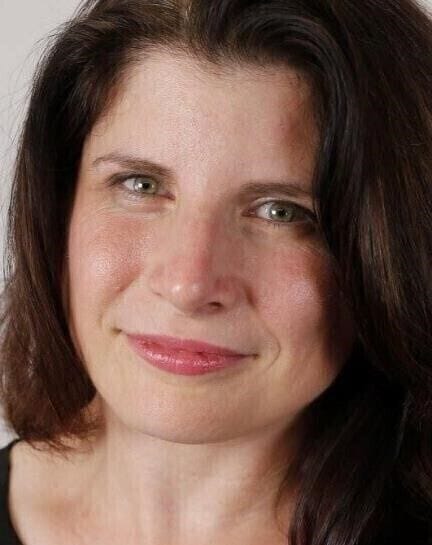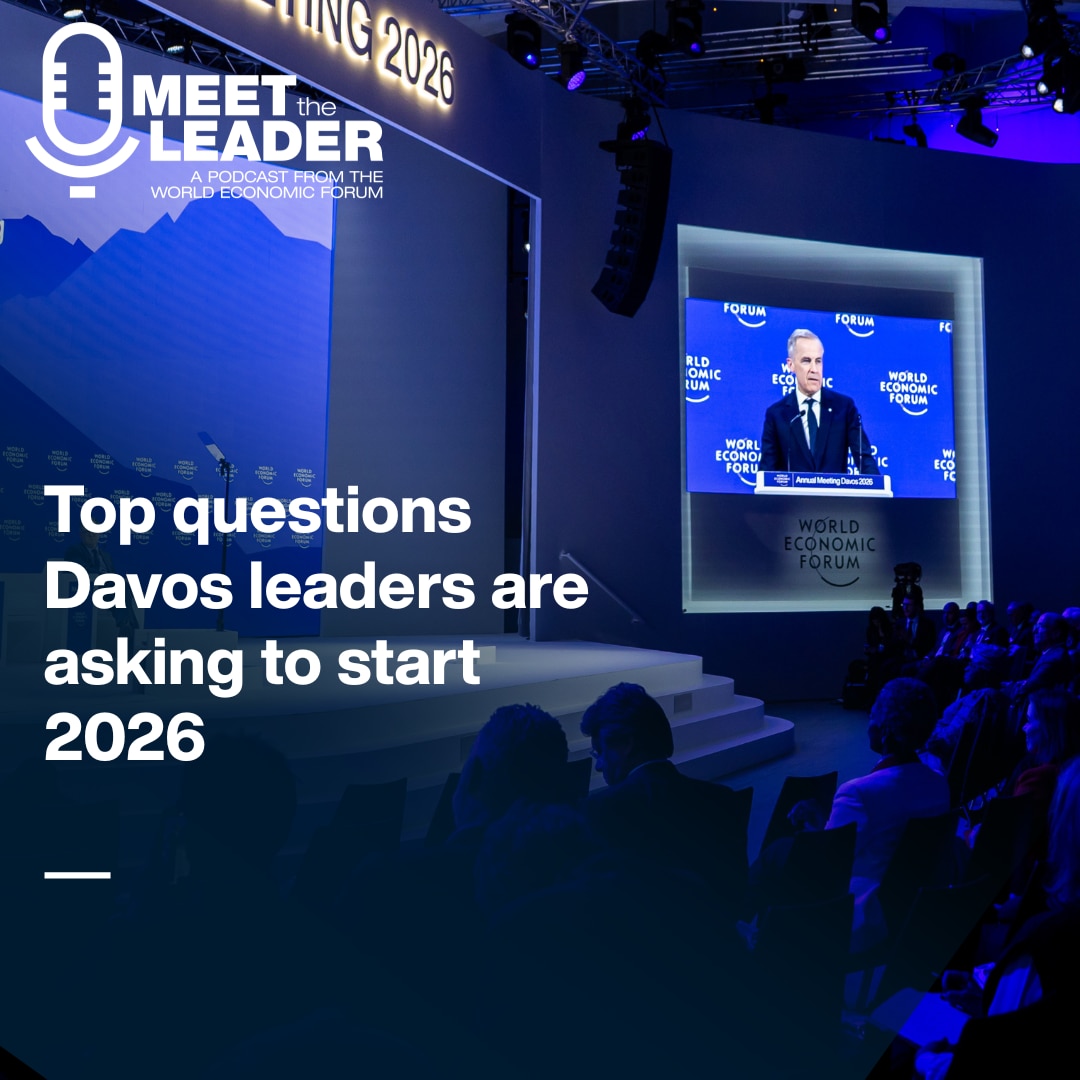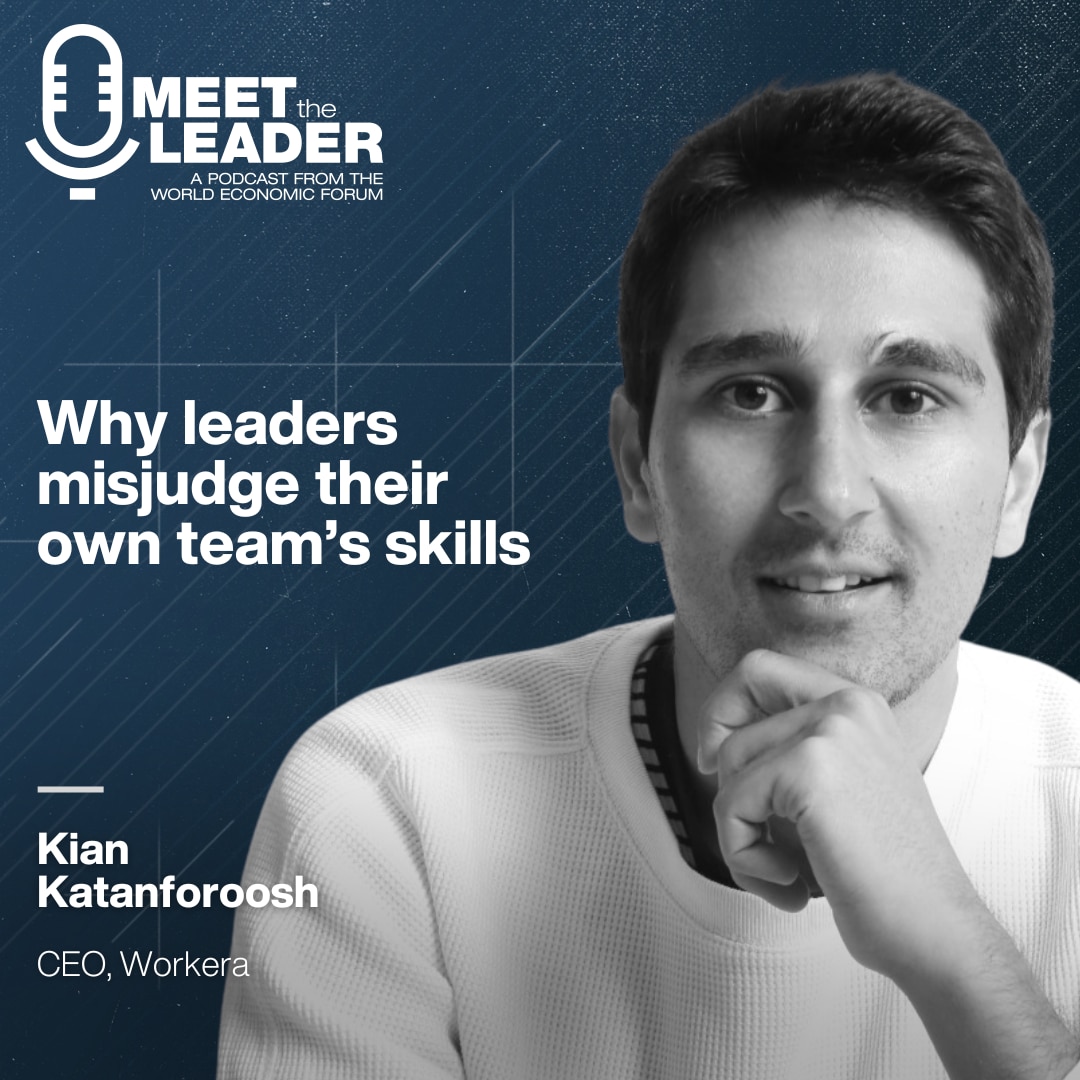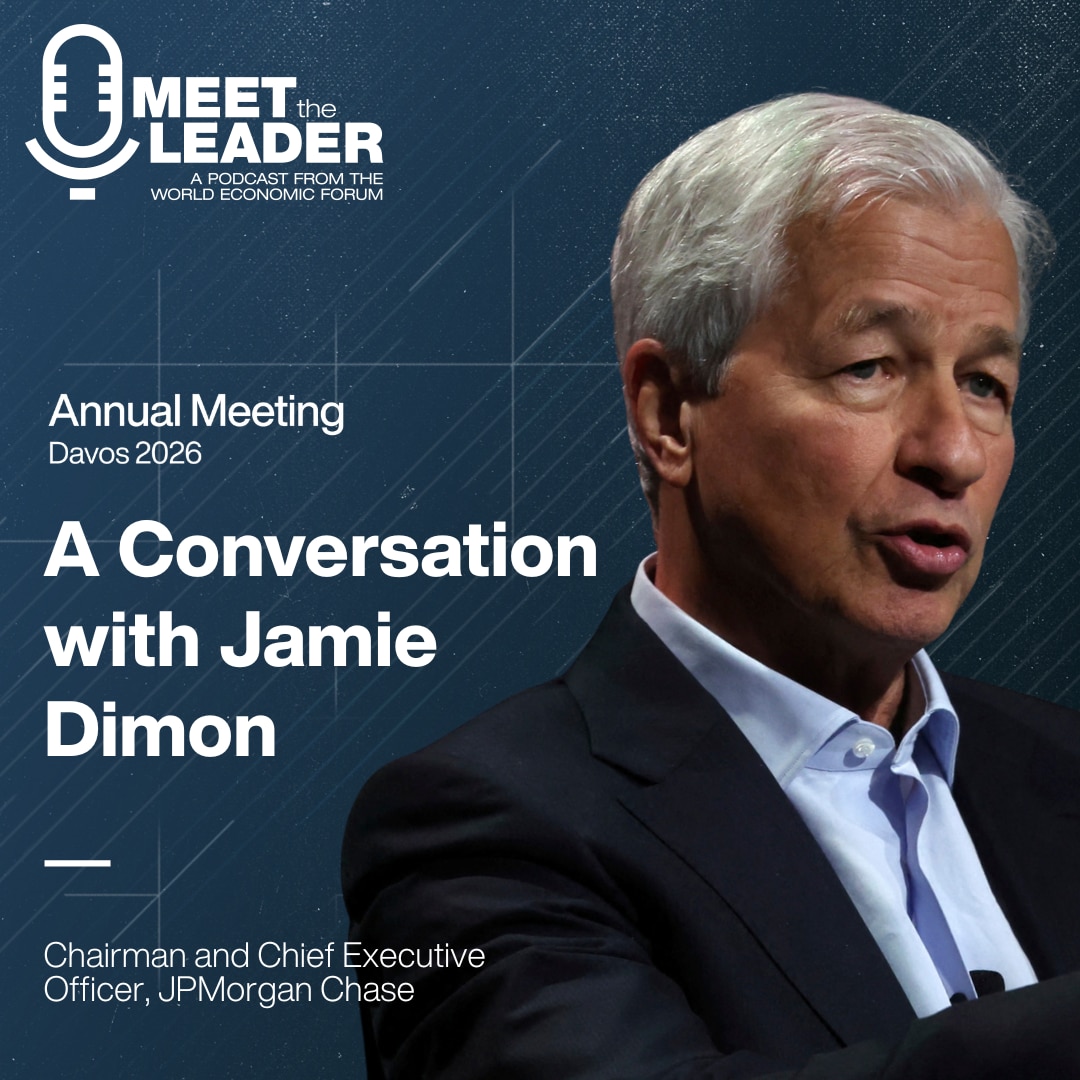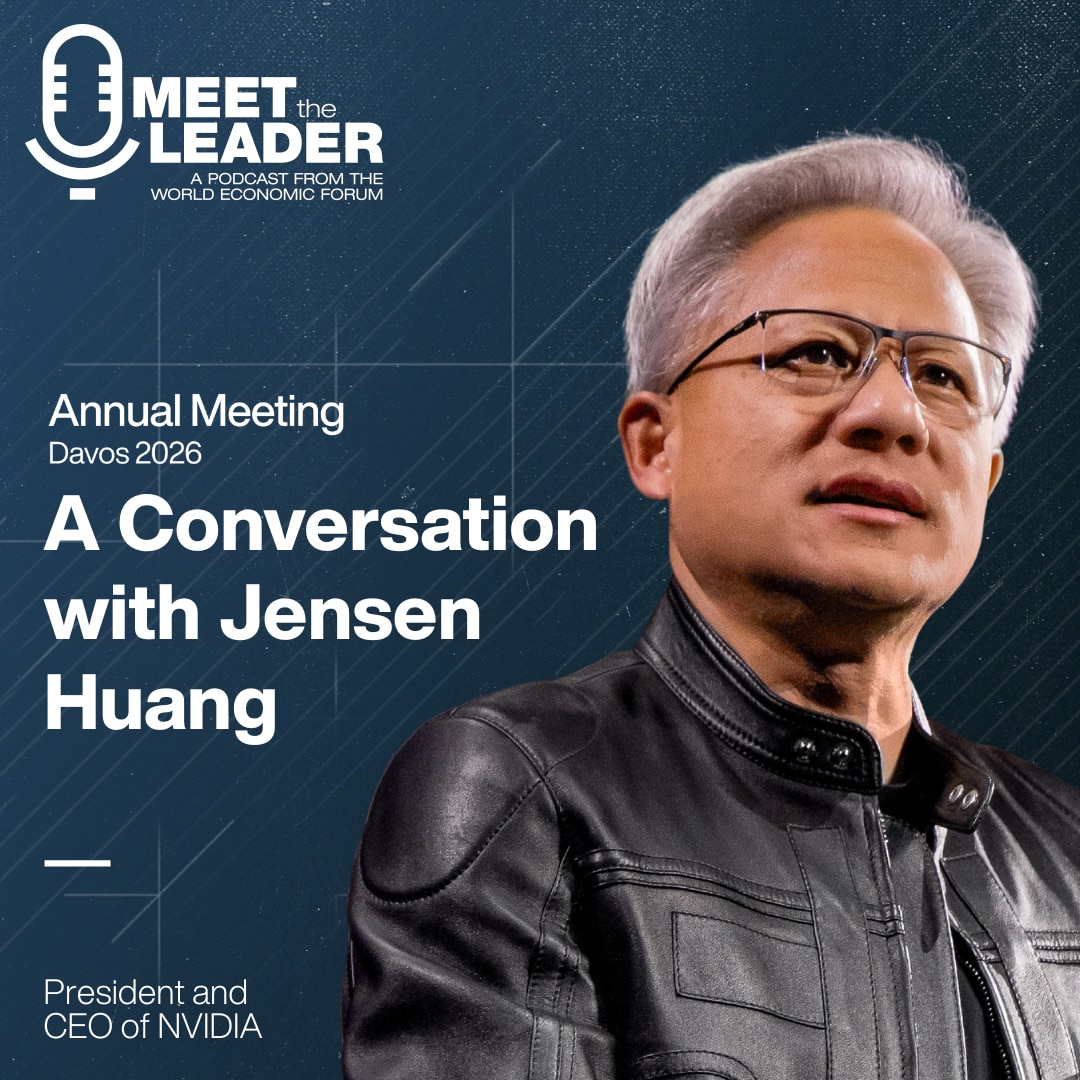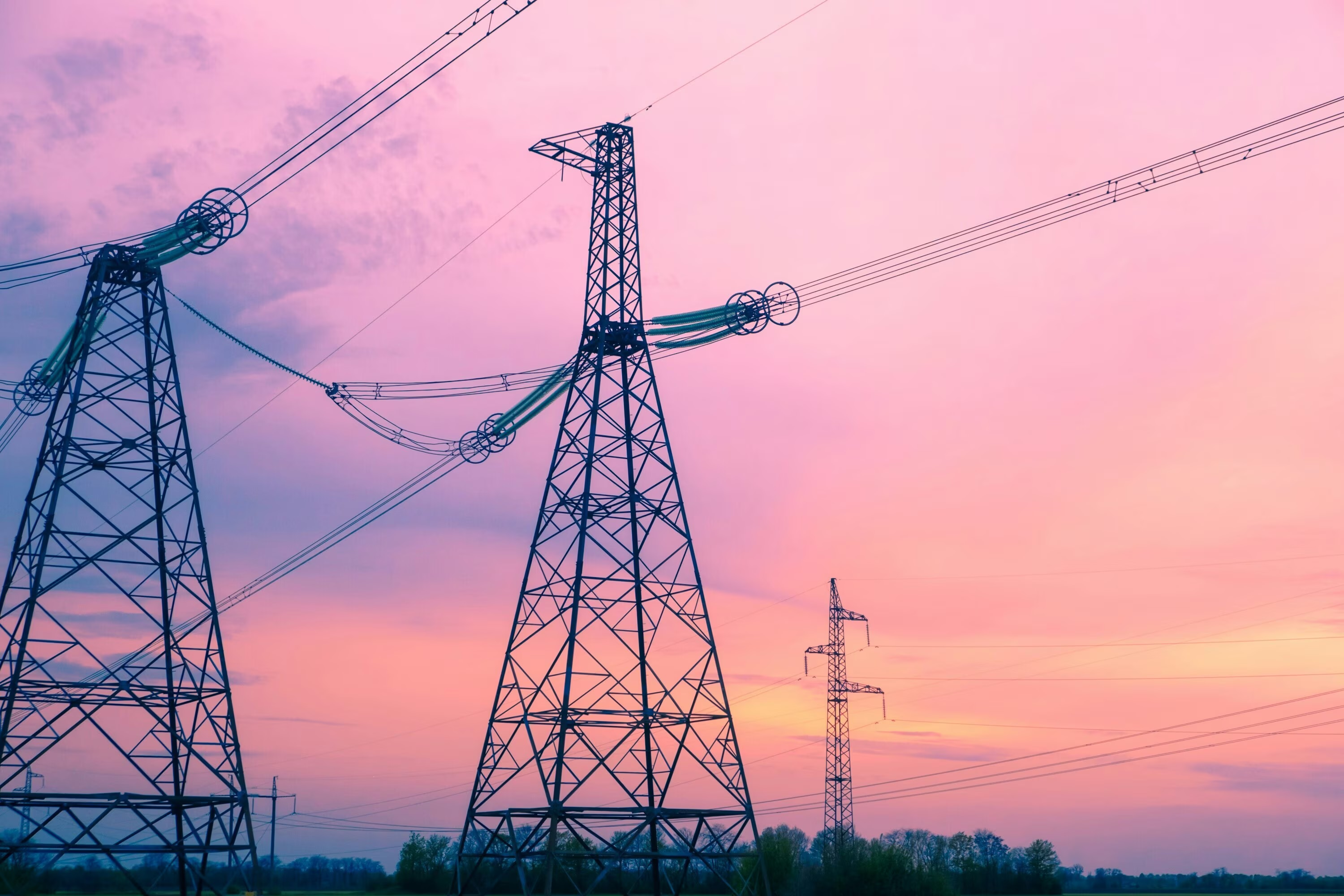The 'triple strength' leaders must develop to drive a sustainable future: OMV CEO
播客文字稿
Linda Lacina, Meet the Leader: Welcome to Meet the Leader, the podcast where top leaders share how they’re tackling the world’s biggest challenges. In today’s episode, we talked to the CEO of energy and chemicals company OMV all about what we’ll need to live more sustainably.
Subscribe to Meet the Leader on Apple, Spotify and wherever you get your favorite podcasts. And don’t forget to rate and review us. I’m Linda Lacina from the World Economic Forum and this is Meet the Leader.
Alfred Stern, OMV: We must use sustainability as an innovation and a growth driver to generate the business of the future.
Linda Lacina: How can we live more sustainably? And how can sustainable living be easy, accessible and even affordable? It’s a question that we’re all looking to answer but especially OMV.
OMV got its start as Austria’s state producer of oil and gas in the 1950s and it’s now a multinational with a footprint on five continents. It’s focused on using its capabilities and knowledge to tackle climate change, looking at sustainable chemicals, fuels and energy, and looking to be net zero by 2050.
I had the chance to talk to OMV's CEO Alfred Stern about this shift. He talked to me about special projects that the company’s driving, including how it’s using its deep knowledge of the Vienna Basin to develop a heating district powered by geothermal energy.
It’s a project that won’t just connect thousands with climate neutral heat in just a few years, it’ll also help strengthen the city’s energy resilience and its energy independence. He shared with me what’s needed to speed the energy transition.
The changes we’ll need, the policy, re-skilling and even business partnerships that are critical to making this change work in the long term.
He also shared his own background in materials science and R&D and what that taught him about the difference between inventing and innovating, and the mindset that’s needed to drive real change for the climate going forward.
We’ll get into all of that, but first, we’ll talk more about geothermal energy, what it is and why that’s so important.
Alfred Stern: When we talk about the energy transition, we are normally immediately thinking about electrification and about decarbonizing electricity. So, basically moving to photovoltaics and wind for energy, for power generation.
Now a big part of our energy consumption is also from the heating sector, heating our homes but also in industry. And the decarbonization of this heating sector can be done with geothermal energy.
That is a great way how to do this because basically when you look around the globe, in average per 100 metres, the temperature goes up by 3 degrees Celsius. If you drill to the centre of the Earth. So in about 3-4,000 metres, you find 100- 120 degrees Celsius.
That depends a little bit on the geology and that heat energy can be used for both heating homes -- but also if the heat gradient is enough -- to generate power.
Therefore, it’s a very important factor in the energy transition to decarbonize our heating in the economy.
Linda Lacina: It was a special project initiative you guys have. It’s a heating district and it is planned for 2040. What is that? Where is it? And help us picture it.
Alfred Stern: Yeah. So the home of OMV is here in Vienna. That’s where our headquarter is. That is because we actually started producing, exploring and producing oil and gas here in the Vienna Basin. We have done this over 60 years.
So we know that geology here, inside out and what we have learned over the years is when we drill down, there’s not always oil and gas that we find but we also find hot water. So we know really well the geology here. And what we have done is we have teamed up with Wien Energie, which is the district heating network provider here in Vienna, one of Europe's biggest district heating network. And we will provide the district heating network with this decarbonized heat from geothermal energy.
The way we do that is we split the tasks. Wien Energie has the district heating network. We have all the geology, the geophysics, the drilling, the production knowhow and the end of 2024, we will start our first drilling company.
Linda Lacina: What is the impact that this could have? What is the before and after that people can picture?
Alfred Stern: There’s about 400,000 households in Vienna that are connected to this district heating network. The way it works is you connect your house or the apartment block to the district heating network and you replace gas, heating oil, heating, coal heating that is still in use.
So that’s the basic principle. And what we want to do is we want to decarbonize about 200,000 households of those 400 in the next couple of years. The first drilling campaign that we start in December 2024 will be big enough to supply the first 20,000 households.
In total for the 200,000 households, we need to produce about 200 megawatts of thermal energy that is then provided into that district heating network. Big decarbonization effort.
That's what the city of Vienna wants to do. They want to decarbonize the city by 2040 and this would be one of the major contributions of achieving this.
Linda Lacina: And in the process of working on this, is there anything that surprised you?
Alfred Stern: I think there’s a whole number of things that surprised me about this project, and it’s not so dissimilar from some of the other projects that we do. The first thing is our people are the key to make those things happen.
And what you find over and over again in this reinventing of essentials is really that the skills that our employees have today are essential so that we can make those things happen.
And what do I mean with this? If you look at geothermal heating, the drilling, the geology, know how, the geophysics know how, the production is no different really to what we do in oil and gas.
But then when you come to the production, some of the things change and how quickly our employees step in and then look at those things and put their engineering hats on and think about how we can further improve this, how we can make this cheaper, how we can make it more efficient, how we can make it more productive.
And that’s really the exciting things about those things, because I think it’s really a key contribution that we as OMV can make to the energy transition.
The other part that surprised me a little bit is that the need to actually further develop regulatory frameworks and policies, we need to have more speed in this in order to go faster in this energy transition.
It was really surprising to me that it would be more difficult, more complicated to drill a geothermal well than it would be to drill an oil and gas well to get the permits right. For the geothermal well, we need to go through the approval processes of the mining authority, of the water authority and then finally the trade authority.
That is just surprising because it takes longer, it takes more effort. I'm very happy that for this first well that we will drill in December 2024, we have done all this, we have done all the approvals and everything so that we can go ahead but still, to get more speed, there’s work to do there.
To get more speed, there’s work to do.
”Linda Lacina: And if you had advice for maybe other areas that we’re looking to sort of tackle and sort of tap geothermal heat, what should they be doing if there are private sector leaders or even elected leaders who say, hey, we need to do something with regulations to sort of update it for modern needs.
What should they be thinking about? How can they educate themselves? What do they need to be doing?
I think it’s actually quite interesting that change is the more scary things that we have in our work lives but the reality is nothing is as constant as change.
”Alfred Stern: Yes. In OMV, in our strategy, we really use sustainability as an innovation and growth driver. And I think this is an important principle that all of us, not just the business and the industry but also civil society and the regulators have to internalize we must use sustainability as an innovation and a growth driver to generate the business of the future.
Because in the end, part of sustainability is not just to reduce CO2 emissions but it is also required that we keep making money with this. Otherwise, we cannot continue to finance the necessary investments.
This playing together of people, planet and profit, what we need to do in this sustainability transformation, that would be probably the idea. How can we work together closer in order to make this happen? Because in the end, also, we need to be clear the transformation to more sustainable energy, to more sustainable materials will be something that requires more collaboration.
The transformation to more sustainable energy, to more sustainable materials will be something that requires more collaboration.
”The operating principle in our strategy is to move from a linear economy to a circular economy and a linear economy is in that way easier to do because you have handoffs in the linear supply chain from one to the next and when you come to the end, you stop. In a circular supply chain, you need to keep things going in circles, which means you need product partnerships.
And that’s the same here with the geothermal. That’s the same thing with circular chemicals, with recycling, with sustainable fuels, renewable fuels that we are also producing. We need to accelerate. We see it in the climate change every day and we need to move as fast as we can. But for this, we also need to have stable investment conditions where we are and a good regulatory framework to make it happen.
Linda Lacina: How important is education? Both within companies but also within sort of local governments, local leaders? You know, we talk about circularity. It's been getting an increase in awareness in recent years.
Geothermal energy is also been talked about more often than not. But most people still would maybe struggle to give me an easy definition of it if I if I stopped them on the street.
What do we need to improve the education of this, so that people can then take the next step and make a practical application in their particular job, whatever that happens to be? How can we improve education of, say, geothermal energy.
Alfred Stern: So education is key for what we are doing, be it geothermal energy or be it decarbonizing our current operations. Let me just start in my own company. In OMV, what we all are doing, we have established a transformation academy in OMV because if I’m asking my 21,000 employees to contribute to decarbonizing, to reducing scope one, scope two emissions and to come with new products to reduce scope three emissions, they need to understand how does this actually work.
So we need to educate our people about CO2 measurements, about accounting of it. What are the KPIs? How do we want to drive forward? Then there’s also technologies that we need to teach people and to bring people to, let’s say, broaden the perspectives, build on what they have learned so far but broaden that and include new things that are important for this sustainability transformation.
Just one example would be when I look at our apprentice academy, our future academy, where we are training our apprentices, we are now including a lot of education around how to measure methane emissions and how to avoid them. We are pretty good in this. In OMV, we have brought down our methane emissions over 90% versus the baseline of 2019. But we want to go further.
We need to go further and for this, we need to make sure the operators out in the field, they understand how to measure this. They have state of the art tools in their hands and they need to know how to mitigate, how to stop those type of emissions. These education things are critically important, not just for the apprentices but for all employees, including the Executive Board and the CEO and the Supervisory Board. So trainings on these areas are really important.
Then I want to talk just briefly about external, because I do think it is important that people pick up technical skills because this entire transformation will only happen through innovation and technology. It needs to be very clear, some of the technologies that we need to get to an end state of 2040 and 2050, we don’t even know exactly how they will work.
This entire transformation will only happen through innovation and technology.
”So having engineers, scientists, business people that have a state of the art training in these areas is critically important for what we are doing here. And getting those employees into our company.
Linda Lacina: A lot of companies are focused, of course, on reskilling. There’s a lot of reasons for that, including, of course, the energy transition but also the fact that there might be demographic shifts and it might be sort of difficult to bridge certain labour gaps and things like that and get the people that we need.
In your mind, what question should I be asking if I am doing a training programme like your company?
Alfred Stern: The most important thing to ask is: how do your employees feel about this? Do they feel empowered? Do they feel engaged? Do they feel energized by what you are doing? So training is one of the key things around this. But of course, having a strong purpose, having motivating way of working with the entire team in the company is key.
Because let’s not make any mistakes, not everything that we will try here will work but we need to have people that are happy to get up one more time than they fell down to make it to the finish line.
And that’s really critically important for this, we need the motivation and my experience is actually in particular the younger generations that are coming to the company.
They are perfectly happy, they understand that today we have an energy world that is mainly based on fossils and that we need that to keep our lifestyles that we have today but they want to be involved in making it better and making it better as fast as we can through innovation and technology.
Linda Lacina: The purpose and the passion -- it's interesting you mentioned that as opposed to the technical skills and I think here’s a question for you. Do you think that having that passion helps people adapt more because the science will change, the technologies will change and they have to adapt.
Does having that passion and purpose help sort of propel them, as all these things will be changing at faster and faster cycles?
Alfred Stern: Yes, I think it’s actually quite interesting that change is the more scary things that we have in our work lives but the reality is nothing is constant as change. When we look back, none of us work in a company that works the same way it works today.
So we are continuously confronted with change and the important thing is to have the right agility and to have the right absorption to be able to go through these changes and to go through them fast. Because in the end, the leaders will be the ones that can use the opportunities that are always hidden in those changes.
I’m always surprised and encouraged to see how easy it is for people to actually take their base of what they have learned in their job so far, upskill it and add something to it. Let me just give you one example of this.
We are today producing and supplying gas for electricity production but also so that households can heat with it. For this we are operating big gas storages, underground gas storage, so we are very experienced in handling dangerous gases.
At the same time, we have development projects now for carbon capture and storage. So those are underground storages where we want to permanently store carbon dioxide, CO2. And a lot of these skills, it’s underground storages, geologies that we are going to use for this. It’s gases that need to be handled with care but it's a different gas to natural gas. So that’s the thing to learn you a different gas.
But all the other things our employees can use what they have learned so far and I think that’s always interesting to see how fast this upskilling can actually happen when people are motivated and want to go through the change.
Linda Lacina: Is there anything else that needs to happen globally so that we can kind of push to go carbon neutral, to push for the energy transition? What else needs to happen to make the shift.
Alfred Stern: Yes. So innovation and technology I mentioned before but this is key, I always want to highlight this because we are today competing with the supply chain that has been optimized for 70 to 100 years.
And I know the engineers in OMV but I also know the engineers in the chemical and oil and gas industry. Those are industries that have excellent engineers that have worked for 70 to 100 years to take cost out, to optimize. And this is what we are competing with.
This is what practical innovation and technology on the ground is and this is what we need more investments into that we can make those transitions faster and that we can come to more affordable energy again, because this needs to be clear.
Energy demand will continue to grow, not just because there will be more people on this planet but also because thankfully, people will live better lives. And we know exactly that there’s a strong correlation between GDP and energy consumption in any economy.
So with this, we have to expect energy consumption will go up and our job will be to make sure that energy is available in a secure way, that it is affordable but it also needs to quickly become more sustainable, decarbonized. And this is where we need this innovation and technology for in order to make this happen quickly.
And the second piece that I would say that will be really important is the availability of capital, the financing of this transition. This will require huge amounts of capital. That money needs to be available and needs to be available in a way that it can also be invested into these transformation efforts and that will require the proper regulation and the proper policies in order to make that happen.
Linda Lacina: I want to talk a little bit about you and your background. You were trained as a research scientist. You have a background in material science but also in polymer science. Tell me about that.
Alfred Stern: Yeah, it’s a long time ago since I did that but I still remember quite well. After I was done with my Master’s thesis, I really wanted, instead of studying what other people have discovered, I wanted to discover some things on my own.
So that was my main driver to do a PhD, that I would go and research something, discover some things on my own for the interested ones, right?
I looked at actually failure mechanisms in plastic materials through fracture mechanics. After I did that, I thought, oh, much more interesting would actually be to apply this kind of science and to apply the kind of engineering thinking to innovate because innovate is what produces the progress in our world.
And I was very happy to be able to start in an R&D area in DuPont. And then that was a good job because I could basically do the R&D but I could also scale it up, so I was able to bring it through production and then actually to the market, I was actually training the sales and marketing people to be able to commercialize this.
So I actually went from inventing to actually innovating in that job and that actually, I thought was very interesting and kind of shaped my thinking for the rest of my career.
Linda Lacina: Was there a shift that you needed to make when you kind of went from maybe academia to the business world? Was there a mindset shift away that you needed to work differently. What was that change like for you?
Alfred Stern: When I look back on the R&D, the science and engineering part, it was possible to always focus on the data, on the facts, on the natural laws that are underlying these kind of processes there, it was always very easy to state, look, this is the physics that are here. This is the chemistry. There’s not much you can do about this, right? This is how it works and we can think about how do we apply that as we want it.
Now when you move to business and leadership, this changes significantly because first of all, this is all about people. People make it happen and there’s many, many aspects of that in leadership. But it is about understanding first of all, yourself.
It is about emotional discipline in what we are doing and it is about introspection but then it is about connecting to other people, being able to listen, being able to create win-win situations in order to move that forward.
And then of course, there is the laws of economics that are also some kind of natural laws but maybe not quite as defined as some of the chemistry and physics but still quite helpful to make sure to always bring it back to the basics and make sure we are running business in a way that’s future looking, and that is creating the right cash flows.
I think leaders of today need to develop into first very independent beings, into persons that know themselves, that understand what is driving them.
”Linda Lacina: You talked a little bit about how leadership, you know, has at its base an introspection from the leader, right, that if you know yourself better, you’ll be able to connect with others. What’s something that you learned about yourself that has helped you lead?
Alfred Stern: Yes, I think one of the things that is always important is to ask oneself about the motivations.
The one thing that I have learned that is extremely useful is to always surround myself with some people that have independence, that can challenge me, that can consult me in order to keep myself honest, because sometimes we are not completely clear, are we doing things because it's something inside of us that is driving us? Or is it really because of strategic and business reasons that we are driving?
Because we know this, we are all driven by a huge amount of biases that are coming out of our development since we were babies and not always are we completely clear about this and having external voices that help to bring these things out and then being honest enough to being honest enough to be able to identify that is extremely helpful in business.
Linda Lacina: It’s really, really hard for CEOs to get honest feedback. When you’re talking to people. What do you look for to sort of know? They’re being honest with me. They’re really giving me the real deal. They’re being honest with me and they’re not just sort of telling me maybe what I’d like to hear.
Alfred Stern: Yes. For me, trust is one of the most important tools because it makes companies so much more efficient if we can trust each other. And for me it’s quite simple, right?
There’s a number of things that are increasing trust that are driving trust. And there are two very straightforward things. One is the competence level of people. You can only trust people that are competent in what you are talking to them about.
Secondly, it’s reliability. So do these people say what they do and do they do what they say. So those are two things that increase trust.
And the third thing would be a kind of how openly do they communicate with you and that you can see quite quickly, actually, if you pay attention to that, are they close enough to me in order to share concerns that they have or do they also share bad news with me equally like good news?
So and the one piece that can heavily reduce the trust is high self orientation of people. And this is more common than one thinks it could be from organizations or from individuals that they care more about themself than about achieving the result and achieving the team result. And these are the kind of things that I watch when talking to people. And over time one gets to know each other better.
Linda Lacina: What is a practical way that you guys make sure that people from diverse, cross-sectoral teams can can talk to each other?
Alfred Stern: Yes, I think that’s obviously a leadership task that we are engaging in on a regular basis. If you look at OMV, as I said, we are transforming into an integrated, sustainable chemicals, fuels and energy company.
So you already have three segments and there would be a big temptation that people might want to run these completely independent, even though there’s a lot of operational synergies between the different groups and we can use this. And one of the success factors is to explore those to the full potential.
One of the things that we have installed, for example, is a transformation team that has the top leaders from these different segments that, on a regular basis, trying to address together some of the key challenges and to also drive the progress with the strategy and other things would be project based, mixed work themes in order to make this happen.
And of course, we are trying to increase the amount of people that transfer between the different division and the different segments so that this exchange can be more institutionalized because in the end, again, it’s all humans that are living from the connections to the people that they know.
Linda Lacina: If OMV had a traditional old school command centre control structure where one person at the top said, do this and that, would you guys be able to do what you needed for the energy transition?
Alfred Stern: I think this command and control kind of management system was very useful in the past and it also fits better with a linear economy. If you look at the future energy world, I think we will see a much more diverse energy world.
There will be a need for gas, there will be still for quite a while, need for oil. There will be more renewable power. There will be nuclear power, there will be hydrogen. There will be all kinds of different bio energy and so on, right.
So we will see a lot of different forms of energy. And that more diversified kind of landscape does require that we also have lean management systems in place, that we empower teams, that we can take decisions at the place where the actual action happens.
That is easy said but not that easy done and reshaping the organizational culture but also reshaping the processes and the structure in the company is one of the key parts that needs to come in parallel to just the business portfolio changes.
Linda Lacina: You guys work in innovation. Innovation is about experimentation. It’s about change and adaptation. Is there ever a moment that you you hit a wall? You get through it, you know but you hit a wall. What was one of those times and what did you learn?
Alfred Stern: So I think one of the big things that happened to me that a while ago was in the negotiation of a big contract, we just couldn’t get to a solution with the customer. Both sides had good reasons for asking what they were asking for and in the end we got stuck in a complete lose-lose position.
And at that time, we both stepped away and I used some people that were not related in that negotiation process says to talk through the problem with them and I actually thought it was quite amazing by talking to these people that hadn’t been part of the process and in that way were not constrained in their thinking.
And trying to break it down back to what do both parties actually need and want, we could actually come up in the end with a solution that worked. And I thought that was amazing because it just shows you how much you can get to tunnel vision and get stuck into certain situations. That was extremely useful.
And for me, it’s taught me to seek advice from other people is often quite useful but to also keep an open mind and believe that there’s always alternatives and not just one solution to a problem.
Linda Lacina: Is there something that you do now that would never have occurred to you at the beginning of your career, either when you’re working with people or when you’re trying to sort of make a change happen? What’s something you do now that would just never have occurred to you.
Alfred Stern: I think one of the things that hadn't occurred to me, right, when I started, I was an individual contributor. so most important to me was to get my job done, to do my things and to do them well.
And what I’m thinking now, most of the time is what do I have to do so that I can get my organization to move in the right direction? How can I support them? What kind of training or what kind of support do I have to give them so that we can move in the direction of the strategy as fast as it is possible?
Linda Lacina: We have a report that’s coming out on skills for the future, job skills for the future. And one of them happens to be they mentioned leadership as a soft skill that’s going to be desperately needed. And it sounds like a funny thing, right? That we need leaders. Of course we need leaders.
But in your sense, what is the skill that leaders might need more than ever, right? We don’t just need leadership. We just don’t need people with ideas pointing around things to do. What is the skill that leaders need now more than ever in your opinion?
Alfred Stern: I think it’s really a mixture of two things, right? I think leaders of today need to develop into first very independent beings, right, into persons that know themselves, that understand what is driving them. How do they react to certain situations.
And then they need to build on this, know how to build interdependence with the organizations around them. And that is not just the organization within their company but also stakeholders outside the company. I think this triple strength will become more and more important.
The transformation that we have in front of us and not just the energy transformation, but there will be many other transformations. Business will look different in 10 years and in 20 years technologies will be different. Think about artificial intelligence alone, right?
This will change the way we work. It will change the way our societies function. With this, triple strength will be required that business leaders can also connect to politics and to civil society and bring those three different aspects together because only in the work of these three things together, we can make the necessary transformation happen.
Linda Lacina: Is there a book that you recommend?
Alfred Stern: If you just give me one book I would recommend to everybody Mindset from Carol Dweck about growth mindset.
Because I think accepting the fact that none of us are born with the perfect skillset but that we all have the capability to learn from each other, to learn from mistakes, to take challenges as an opportunity to grow and not as an opportunity to run away and escape that if others are doing something excellent, it’s not a competition but it’s maybe an opportunity to learn and to copy some things that we can also, in order to be more successful. This is something that we all need more than ever before.
Linda Lacina: What is a piece of advice that you’ve always been grateful for?
Alfred Stern: Maybe three simple things. First of all, know yourself. Secondly, be clear about what your purpose and your vision for your life is. And number three, surround yourself with the right people.
Linda Lacina: If you hadn’t learned those things, how would your leadership journey, how would your life be different?
Alfred Stern: I couldn’t have made it to where I am today and I think I couldn’t make the impact that I’m making today. I think these three things have always helped me. Also, when I’m in difficult situations or when I don’t know how to get on to go back and reorient and use these three things are always good.
They’re kind of like a North Star in order to reset the compass when things get tough and I think that’s important that one always can re-find the right direction.
Linda Lacina: That was Alfred Stern. Thanks so much to him. And thanks so much to you for listening. The World Economic Forum publishes an annual Energy Transition Index. We’ll make sure to have that link in the show notes.
Find a transcript of this episode, as well as transcripts from my colleague's podcast Radio Davos on wef.ch/podcasts.
This episode of Meet the Leader was produced and presented by me, with Jere Johannsen and Taz Kelleher as editor and Gareth Nolan driving studio production.
That’s it for now. I’m Linda Lacina from the World Economic Forum. Have a great day.
How can we live more sustainably? OMV's Alfred Stern takes us through the big innovations the Austrian energy and materials company has in progress, including a geothermal heating project that will help to decarbonise Vienna by 2040. But he also shares the bigger tactical pieces that must be in place for real change, from updating mundane practices like permitting to continually educating staff (from execs to those in the field) on topics like measuring methane and how to curb its emissions. This former research scientist who got his start in academia also shares what his background taught him about the difference between inventing and innovating, how he weighs evidence and honest feedback and the mindset that leaders will need need to build nimble teams empowered to drive change for the future.
话题:
能源转型分享:
更多集:
每周 议程
每周为您呈现推动全球议程的紧要问题(英文)
